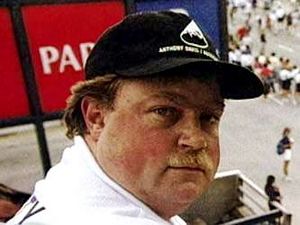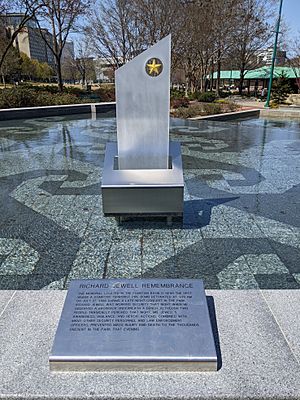Richard Jewell facts for kids
Quick facts for kids
Richard Jewell
|
|
|---|---|
 |
|
| Born |
Richard White
December 17, 1962 Danville, Virginia, U.S.
|
| Died | August 29, 2007 (aged 44) Woodbury, Georgia, U.S.
|
| Occupation | Security guard Police officer Deputy Sheriff |
| Known for | Alerting the police and public prior to the Centennial Olympic Park bombing during the 1996 Summer Olympic Games in Atlanta, Georgia, saving the lives of hundreds of attendees in the process, and then being falsely accused of the bombing |
| Spouse(s) |
Dana Jewell
(m. 1998) |
Richard Allensworth Jewell (born Richard White; December 17, 1962 – August 29, 2007) was an American security guard and law enforcement officer. He became famous for his actions during the Centennial Olympic Park bombing at the 1996 Summer Olympics in Atlanta, Georgia. Richard Jewell found a backpack with three pipe bombs in the park. He quickly helped clear the area before the bomb exploded, saving many lives.
However, for several months after the bombing, Richard Jewell was wrongly suspected of planting the bomb himself. This led to a lot of negative attention from the news media. Even though he was never charged with a crime, he went through a difficult time. In 2005, Eric Rudolph confessed to the bombing and other attacks, clearing Richard Jewell's name completely.
Richard Jewell's story has been told in movies and TV shows, including the 2019 film Richard Jewell.
Contents
Early Life of Richard Jewell
Richard Jewell was born Richard White in Danville, Virginia. His mother, Bobi, worked with insurance claims, and his father, Robert Earl White, worked for Chevrolet. When Richard was four, his parents divorced. Later, his mother married John Jewell, who was an insurance executive. John Jewell adopted Richard, and that's how he got the last name Jewell.
The Olympic Park Bombing
Centennial Olympic Park was a central place for the 1996 Olympics. Thousands of people were there for a concert and to have fun. Richard Jewell was working as a security guard at the event. He found a suspicious bag and quickly told officers from the Georgia Bureau of Investigation. This was just nine minutes before the bomber, Eric Rudolph, called 9-1-1 to warn about the bomb.
Richard Jewell and other security guards started moving people away from the area. They wanted a bomb squad to check the package. Thirteen minutes later, the bomb exploded. It killed one person, Alice Hawthorne, and injured over 100 others. A cameraman also died from a heart attack while rushing to film the event.
Investigation and Media Coverage
At first, news reports praised Richard Jewell as a hero for helping people get to safety. But just three days later, The Atlanta Journal-Constitution newspaper reported that the FBI was looking at him as a possible suspect. This was mainly because of a "lone bomber" criminal profile.
For several weeks, the news media focused heavily on Richard Jewell. They often called him a "person of interest". Many news stories suggested that Jewell was a failed law enforcement officer who might have planted the bomb himself so he could "find" it and become a hero.
Richard Jewell was never officially charged with the crime. However, the FBI searched his home twice and questioned his friends and family. They also watched him 24 hours a day. The pressure on him only began to lessen after his lawyers hired a former FBI agent to give him a polygraph (lie detector) test, which Jewell passed.
The Justice Department later looked into how the FBI handled the case. They found that the FBI had tried to trick Jewell into giving up his rights. They told him he was taking part in a training film about bomb detection. The report said there was "no intentional violation of Mr. Jewell's civil rights."
Richard Jewell is Cleared
On October 26, 1996, the US Attorney in Atlanta, Kent Alexander, sent Richard Jewell a letter. It said that "based on the evidence developed to date ... Richard Jewell is not considered a target of the federal criminal investigation." The letter did not include an apology. However, in a separate statement, the U.S. Justice Department said it regretted that information about the investigation had been leaked to the public.
The statement also said that Richard Jewell "endured highly unusual and intense publicity." It added that this publicity was not planned by the FBI and actually made the investigation harder. It reminded the public that Richard Jewell had never been charged with any crime.
In July 1997, U.S. Attorney General Janet Reno said she personally regretted the leak. She stated, "I'm very sorry it happened. I think we owe him an apology. I regret the leak." In 2006, the Governor of Georgia, Sonny Perdue, honored Richard Jewell for his rescue efforts. He publicly thanked Jewell for saving lives and said he "deserves to be remembered as a hero."
Life and Career After the Bombing
After the bombing incident, Richard Jewell worked in different law enforcement jobs. He was a police officer in Pendergrass, Georgia. He also worked as a deputy sheriff in Meriwether County, Georgia, until he passed away. He also gave speeches at colleges.
In 1997, Richard Jewell spoke before a committee of the U.S. House of Representatives. He asked for an independent investigation into how FBI agents handled his case. He also appeared in Michael Moore's 1997 film The Big One. He even had a funny appearance on Saturday Night Live in September 1997.
Richard Jewell married Dana Jewell in 1998, and they stayed married until his death. They bought a farm south of Atlanta. In 2001, Jewell was the Grand Marshal of Carmel, Indiana's Independence Day Parade. He was chosen because the parade's theme was "Unsung Heroes." Every year on the anniversary of the bombing, until he became ill, he would privately place a rose at Centennial Olympic Park where Alice Hawthorne died.
Clearing His Name Through Lawsuits
After he was cleared as a suspect, Richard Jewell filed libel lawsuits against several news organizations. These included NBC News, The Atlanta Journal-Constitution, CNN, and the New York Post. He also sued Piedmont College, his former employer.
Jewell sued the Atlanta Journal-Constitution because he felt their headline, "FBI suspects 'hero' guard may have planted bomb," started all his troubles. This newspaper was the only one that did not settle with Jewell. The lawsuit continued for many years. In 2011, the Georgia Court of Appeals ruled in favor of the newspaper. The court said that the articles were mostly true at the time they were published, even if the FBI's suspicions were later found to be wrong.
CNN settled Jewell's lawsuit for an unknown amount of money. NBC News also agreed to pay Jewell $500,000. Jay Leno even apologized to Jewell on The Tonight Show in October 1996. Richard Jewell also settled with the New York Post for an unknown amount.
He also sued Piedmont College, its president, and a college spokesman. Jewell's lawyers said that the college president gave false information about Jewell to the FBI and newspapers. The college settled the lawsuit for an unknown amount.
In 2006, Richard Jewell said that his lawsuits were not about money. He explained that most of the settlement money went to lawyers or taxes. He said the lawsuits were about clearing his good name.
Richard Jewell in Movies and TV
The film Richard Jewell was released in the United States on December 13, 2019. It is a biographical drama about his life. The movie was directed by Clint Eastwood. Paul Walter Hauser played Richard Jewell, and Kathy Bates played his mother, Bobi. Kathy Bates was even nominated for an Academy Award for her role.
The second season of the crime drama series Manhunt, called Manhunt: Deadly Games, also tells the story of the Centennial Park bombing. In this series, Richard Jewell is played by Cameron Britton.
Richard Jewell's story of being wrongly accused based on a psychological profile was also mentioned in an episode of the TV series Criminal Minds (season 3, episode 1).
Later Life and Passing
Richard Jewell was diagnosed with type 2 diabetes in February 2007. In the months that followed, he had kidney failure and other health problems related to his diabetes. His wife, Dana, found him passed away in their bedroom on August 29, 2007. He was 44 years old. An autopsy showed that he died from severe heart disease, with diabetes and problems from obesity as contributing factors.
See also
 In Spanish: Richard Jewell para niños
In Spanish: Richard Jewell para niños
- Centennial Olympic Park bombing
 | Chris Smalls |
 | Fred Hampton |
 | Ralph Abernathy |


